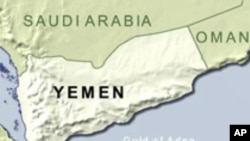When it comes to battling terrorism, most public attention has focused on Pakistan and Afghanistan. But officials are concerned that al-Qaida has found alternative accommodation in the troubled nation of Yemen.
Counter-terrorism officers liken battling a group like al-Qaida to the children's game Whack-a-Mole. The object of the game is to knock out the animal when it pops up out of a hole. But each time you whack it, it disappears back into the hole only to pop up again out of a different hole.
So, say officials, if you whack al-Qaida in a place like Pakistan or turn up the heat in Saudi Arabia, it pops up elsewhere. And it seems to be popping up in the Middle Eastern nation of Yemen, says Michael Leiter, director of the National Counter-terrorism Center.
"In Yemen we have witnessed the reemergence of al-Qaida in the Arabian Peninsula and the possibility that that will become a base of operations for al-Qaida," he said.
Yemen is a country of 528,000 square kilometers along Saudi Arabia's southern border. Richard Barrett, the U.N. coordinator for sanctions on al-Qaida and the Taliban, says few places fit that bill as a terrorist safe haven more perfectly than Yemen.
"You have 22 million people there and you have deep poverty, a worsening economy and a 35 percent unemployment rate, a 50 percent literacy rate, population growing at more than three percent annually," he explained. "Oil production dropped by 40 percent over the last year and the income of the country depends on oil for about 70 percent of government revenues. And of course you have almost a majority of people - I should think a good majority of people - who are under 25. So it is a bit of a powder keg, Yemen," he added.
A Yemeni affairs specialist at the Carnegie Endowment for International Peace, Christopher Boucek says the government in the capital Sanaa is too preoccupied with other matters to make al-Qaida a high priority.
"I think right now the Yemeni government does not view Islamist terrorism as a first order threat. I think they view what is going on in the north with the civil war or the southern secessionist movement as intrinsic threats against the survival of the state," he said. "Al-Qaida or Islamist terrorists do not threaten the survival of the state the same way as half the country seceding does. "So, while the Yemeni government has been eager to fight terrorism, they have done it when it matches with their needs, and when they felt they were in a partnership with the United States on this," he continued.
Officials believe that as the Saudi government increased the pressure on terrorists, many of the Saudi al-Qaida have moved into Yemen, and the Saudi and Yemeni branches merged earlier this year into al-Qaida on the Arabian Peninsula.
On August 27, a Yemeni suicide bomber lightly wounded Saudi Prince Mohammad bin Nayef, who is charge of Saudi Arabia's counter-terrorism program. The bomber concealed the explosives inside his body.
Officials are also concerned the terrorist problem will grow as Yemen's economy declines. Not only has the world price of oil plummeted, but Yemen's oil is drying up, with production dropping from 450,000 barrels a day in 2003 to under 200,000 barrels a day now. The World Bank has estimated the Yemeni wells could run dry by 2017.
If that happens, watch out, says Christopher Boucek.
"Right now, Yemen gets probably 80 percent of its income from selling oil," he pointed out. "That oil is running out every day. And in a couple of years there will be no more oil to sell, at which point everything in Yemen is going to slow down, everything is going to grind to a halt. If there is no more money coming in, then the government is no longer able to spread money around. That is when things will get really, really bad," he concluded.
Yemen is also faced with a water crisis as the underground aquifers that supply the country are drying up. One estimate has Yemen's water supply running out by 2025.




